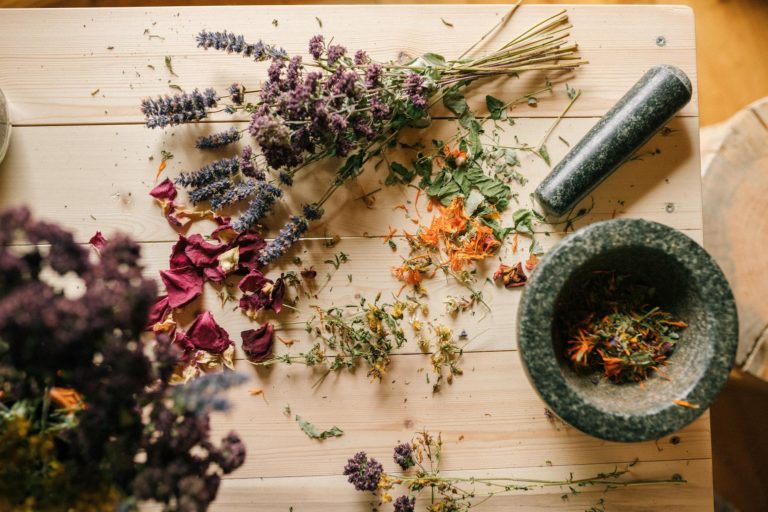For centuries, herbs have been revered for their powerful connection to nature, offering both physical healing and spiritual insight. Today, herbalism remains an integral part of many spiritual practices, bridging the gap between the natural world and personal growth. Whether you’re crafting rituals or simply seeking deeper mindfulness in daily life, incorporating herbs can elevate your spiritual journey.
Understanding the Spiritual Power of Herbs
Herbs carry unique vibrational energies that can enhance meditation, manifest intentions, and cleanse spaces. By working with herbs, you align yourself with the Earth’s wisdom, inviting balance and harmony into your practice.
- Lavender: Known for its calming properties, lavender promotes relaxation and spiritual clarity. Use it to deepen meditation or as part of a cleansing ritual.
- Sage: A staple in many traditions, sage is often burned to cleanse negative energy and invite positivity.
- Rosemary: This herb is associated with protection and memory. It’s excellent for rituals focused on mental clarity or safeguarding your space.
- Chamomile: Symbolizing peace and healing, chamomile can help release stress and prepare the mind for spiritual work.
- Mint: With its refreshing energy, mint is used for purification and to stimulate the senses during rituals.
If you’re curious about other tools to enhance your spiritual connection, you might enjoy our article on Designing Your Sacred Space at Home.
Herbs in Rituals: Bringing Intention to Life
Incorporating herbs into rituals can deepen their impact, adding layers of meaning and intention. Here are a few ways to work with herbs in your spiritual practice:
- Burning Herbs for Cleansing
Smudging with herbs like sage, rosemary, or cedar is a popular practice for clearing energy. Light a bundle of dried herbs and allow the smoke to cleanse your space, objects, or even yourself. Always set an intention as you perform this ritual, such as releasing negativity or welcoming peace. - Herbal Infusions for Meditation
Drinking herbal teas can prepare your mind and body for meditation. For instance, chamomile or lavender tea can calm your spirit, while peppermint or ginger tea can invigorate and focus your mind. - Creating Herbal Sachets
Fill small cloth bags with dried herbs and place them under your pillow, on your altar, or carry them with you. Lavender promotes restful sleep, rosemary encourages mental sharpness, and cinnamon boosts protection and prosperity. - Herbal Baths
Adding herbs to a bath is a powerful way to cleanse both body and spirit. Combine rose petals for love, chamomile for relaxation, or eucalyptus for rejuvenation. Steep the herbs in hot water first, then add the infusion to your bath.
To learn more about aligning personal rituals with natural cycles, see our post on Embracing the Moon: Rituals for Each Lunar Phase.
Daily Life: Simple Ways to Incorporate Herbs
You don’t need elaborate ceremonies to enjoy the spiritual benefits of herbs. Small, mindful practices can be just as impactful.
- Herbs as Symbols: Place sprigs of basil in your kitchen for abundance, or keep rosemary near your workspace for focus.
- Herbal Incense: Burn herbal incense during your morning routine or before meditation to set the tone for the day.
- Gardening as a Spiritual Practice: Growing your own herbs fosters a direct connection with nature. Tending to plants like thyme, lavender, or sage can be a meditative and grounding experience.
- Herbal Oils: Use essential oils derived from herbs for anointing yourself, your tools, or your sacred space. Diluted oils like frankincense, cedarwood, or chamomile can elevate your spiritual practices.
For more on creating meaningful daily habits, visit our guide on The Power of Visualization for Manifesting Desires.
Herbal Safety and Respect
While herbs are natural, they still require mindful and informed use. Here are some essential tips:
- Research Before Use: Some herbs may cause allergic reactions or interact with medications. Always consult a trusted source or herbalist.
- Practice Sustainability: Harvest herbs responsibly, avoiding over-picking and sourcing ethically grown varieties.
- Avoid Overuse: Start with small amounts, particularly if ingesting or using essential oils, as some herbs are potent.
- Respect Cultural Roots: Many herbal practices originate from specific cultural or spiritual traditions. Use these practices with gratitude and respect for their origins.
By incorporating herbs thoughtfully into your daily life and spiritual routines, you deepen your connection to nature’s wisdom and invite its transformative power into your journey.

